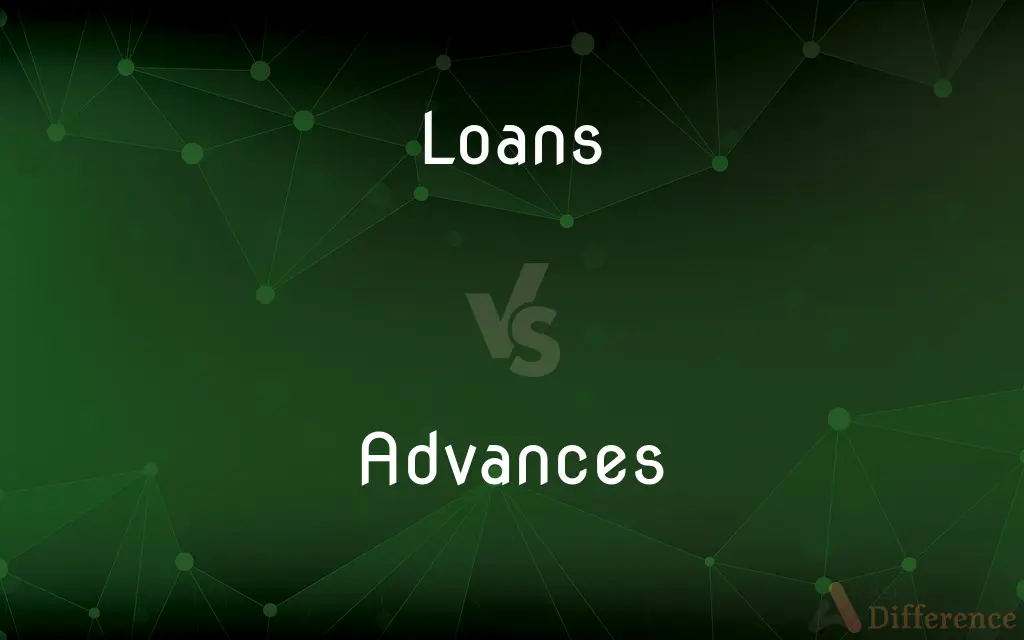Loans vs. Advances — What's the Difference?
Edited by Tayyaba Rehman — By Fiza Rafique — Published on December 19, 2023
Loans are borrowed sums to be repaid, while Advances are prepayments or short-term credits.

Difference Between Loans and Advances
Table of Contents
ADVERTISEMENT
Key Differences
Loans refer to the borrowed amounts of money by individuals, organizations, or entities with the promise of repaying the principal amount along with interest over a specified period. Advances, on the other hand, refer to amounts paid ahead of the actual due or the short-term credit provided by financial institutions.
While both Loans and Advances involve lending, the nature and purpose behind them differ. Loans usually have a more structured repayment system, with interest rates and specified repayment terms. Advances might be seen in contexts like salary advances, which are typically repaid quickly or deducted from future paychecks.
Loans generally serve long-term financial needs, such as buying a home, car, or for business expansion. Advances, however, cater to short-term financial requirements, offering immediate liquidity.
Comparison Chart
Nature
Long-term borrowings
Short-term or prepayments
Repayment Period
Longer duration, often years
Usually short duration or deducted from future payments
ADVERTISEMENT
Interest
Typically charged over the tenure of the loan
May or may not have interest, often lower rates
Purpose
Financing homes, cars, or businesses
Meeting short-term needs, like salary advances
Collateral
Often require collateral
Typically unsecured, unless it's an advance against a specific asset
Compare with Definitions
Loans
Loans are funds borrowed to be paid back with interest.
She took out a loan to pay for her education.
Advances
Advances are payments made before a service is rendered.
The publisher gave an advance to the author for his upcoming book.
Loans
Loans are formal agreements between lenders and borrowers.
The bank approved his loan application yesterday.
Advances
Advances are short-term financial solutions.
Due to financial constraints, he asked his employer for a salary advance.
Loans
Loans are subject to interest rates and tenure.
The loan has an interest rate of 5% over 15 years.
Advances
Advances can be seen as prepayments for future services or goods.
She made an advance on the custom dress she ordered.
Loans
Loans often have collateral backing them.
Her house served as collateral for the loan.
Advances
Advances might be offered based on trust without rigorous checks.
Knowing his track record, the producer gave him an advance for the show.
Loans
Loans require a thorough credit check and documentation.
To get the loan, he provided documents showcasing his income and expenses.
Advances
To cause to move forward
Advance a chess piece.
Loans
An instance of lending
A bank that makes loans to small businesses.
Advances
To put forward; propose or suggest
Advanced a novel theory during the seminar.
Loans
A sum of money that is lent, usually with an interest fee
Took out a loan to buy a car.
Repaid the loan over five years.
Advances
To aid the growth or progress of
Advanced the cause of freedom.
Loans
The agreement or contract specifying the terms and conditions of the repayment of such a sum.
Advances
To raise in rank; promote.
Loans
The repayment obligation associated with such an agreement
She couldn't afford the loan after losing her job.
Advances
To cause to occur sooner
Advance a deadline by one week.
Loans
The right to payment associated with such an agreement
A bank that buys consumer loans.
Advances
To raise in amount or rate; increase.
Loans
The state of being lent for temporary use
A painting on loan from another museum.
Advances
To pay (money or interest) before due.
Loans
To lend (money or property).
Advances
To supply or lend, especially on credit.
Loans
Plural of loan
Advances
To serve as an advance person for (a trip to be made by a politician or a dignitary)
"advanced the China trip during which the first trade agreements ... were signed" (Suzanne Perney).
Loans
Infl of loan
Advances
(Archaic) To lift.
Advances
To go or move forward or onward.
Advances
To move against another, as when attacking
Advance on the enemy's position.
Advances
To make progress; improve.
Advances
To rise in rank, position, or value.
Advances
To serve as an advance person for a trip to be made by a politician or a dignitary.
Advances
The act or process of moving or going forward.
Advances
A forward move, as toward an objective; a progressive step
An advance in genetic engineering.
Advances
An increase of price or value.
Advances
Advances Opening approaches made to secure acquaintance, favor, or an agreement; overtures.
Advances
The furnishing of funds or goods on credit.
Advances
The funds or goods so furnished; a loan.
Advances
Payment of money before due
An advance on next month's salary.
Advances
The money so paid.
Advances
Preparation, especially publicity, done prior to the appearance of a public figure or the staging of a public event.
Advances
Made or given ahead of time
An advance payment.
Advances
Going before, in front, or forward.
Advances
Plural of advance
Our generation has witnessed great advances in science.
The troops reported enemy advances on several fronts.
He made advances to her when he was drunk.
Advances
Infl of advance
The group advances up the road.
Advances
Advances often lack the structured terms seen in loans.
The advance he received didn't require any interest payments.
Common Curiosities
Can both Loans and Advances have interest?
Yes, but while Loans typically carry interest, Advances may or may not and, if they do, often at lower rates.
Are Loans usually for short-term or long-term financial needs?
Loans generally cater to long-term financial needs.
What are Loans?
Loans are borrowed sums of money to be repaid with interest over a specified period.
Can you give an example of a Loan?
A mortgage taken to buy a house.
What is the primary purpose of Advances?
Advances cater to short-term financial requirements or prepayments for goods/services.
Do Loans always require collateral?
Not always, but many loans, especially large amounts, require collateral.
How are Advances different from Loans?
Advances are prepayments or short-term credits, typically repaid quickly or deducted from future payments.
Are Advances usually secured or unsecured?
Advances are typically unsecured unless it's an advance against a specific asset.
Can you give an example of an Advance?
A salary advance given by an employer to an employee.
Do Advances count as debts?
Yes, Advances can be considered a form of debt as they're amounts to be repaid.
How are interest rates determined for Loans and Advances?
For Loans, rates are often market-driven and based on creditworthiness. For Advances, if charged, rates can be nominal or as agreed upon.
Can Advances be given against assets?
Yes, advances can be given against specific assets, like an advance against inventory.
Is a credit check always required for Loans and Advances?
While Loans often require a thorough credit check, Advances might be given based on trust or previous dealings.
Which usually has a longer repayment duration, Loans or Advances?
Loans typically have a longer repayment duration compared to Advances.
Can Loans be unsecured?
Yes, some loans like personal loans can be unsecured.
Share Your Discovery

Previous Comparison
Pressure Group vs. Interest Group
Next Comparison
Transfer of Shares vs. Transmission of SharesAuthor Spotlight
Written by
Fiza RafiqueFiza Rafique is a skilled content writer at AskDifference.com, where she meticulously refines and enhances written pieces. Drawing from her vast editorial expertise, Fiza ensures clarity, accuracy, and precision in every article. Passionate about language, she continually seeks to elevate the quality of content for readers worldwide.
Edited by
Tayyaba RehmanTayyaba Rehman is a distinguished writer, currently serving as a primary contributor to askdifference.com. As a researcher in semantics and etymology, Tayyaba's passion for the complexity of languages and their distinctions has found a perfect home on the platform. Tayyaba delves into the intricacies of language, distinguishing between commonly confused words and phrases, thereby providing clarity for readers worldwide.














































